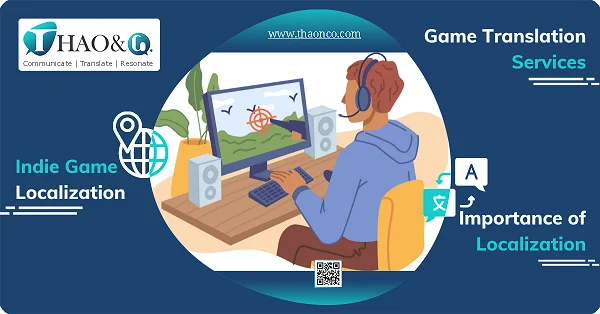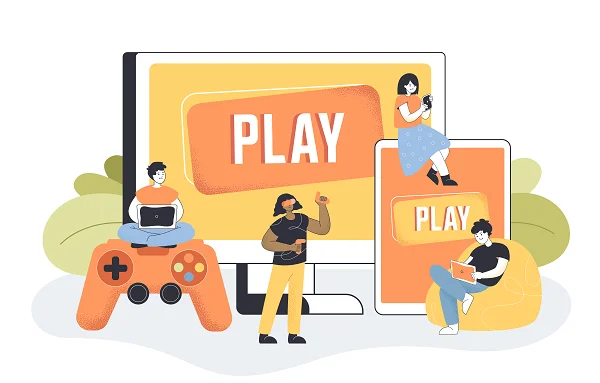What is an indie game? Should you localize your indie games? Read on with the article below by Thao & Co. to discover the answers to some questions related to the Indie Game Localization topic.
Indie games, short for independent video games, are games developed and released by individuals or a small team of developers.
These games are often known for their creativity, uniqueness, and the will to challenge the conventional norms of the gaming industry. Despite facing limitations in terms of resources, budget, and marketing, indie games have achieved significant success and received high praise for their artistic value and gaming experience.
Indie game localization means translating the game’s language from the original to a suitable language in the target market to achieve the predetermined goals.
To answer this question, let’s analyze the positive and negative aspects of this process.
Localization of indie games can bring several benefits to publishers, including:

Here are some important questions you need to answer before localizing games.
This is a crucial step that cannot be overlooked. Clearly defining the goal of localization, the target audience, and transparent quality evaluation criteria will help you make the most appropriate decisions.
Should you localize your games into one language or multiple languages? This may depend on the budget, as well as your specific goals.
Localizing into multiple languages can bring many opportunities for the game publisher, but this should be carefully considered to optimize costs, and time while also accounting for specific requirements.
Before translating, you should determine the target market where there is potential for your game to thrive. You can prioritize choosing languages that players in your target market are most familiar with. This will help you cut down on costs and ensure revenue from the game.
Before deciding on whether to choose localization or internationalization, you need to be able to distinguish between these two.
To make it short, localization is the process of transforming your game into an inclusive and friendly experience for players in a specific target market, making them feel as if they’re playing a locally-developed game.
On the other hand, internationalization refers to standardizing the game for the global market so that players from all over the world can interact with the game in the same way.
The decision to opt for localization or internationalization hinges on the specific goals and budget of the publisher. Each approach brings its own set of advantages and disadvantages.

Cultural difference between markets is a particularly important factor to consider when localizing. Therefore, before committing to game localization, publishers and game translation agencies need to meticulously research and analyze the target market, including cultural nuances.
This ensures that the new language version of the game does not encounter any sensitive cultural issues in the target market. Moreover, this helps make the localization appealing, familiar, and friendly to the players.
Through research and analysis of the target market, you can identify whether your game has any elements that go against the culture or beliefs of the target players. This can help you decide whether to release your game in that market.
A game containing controversial elements can result in detrimental results, especially the possibility of having to recall the game. You can refer to the examples of incorrectly localized games from major publishers to avoid similar mistakes.
The budget is a crucial factor in indie game localization. Therefore, publishers need to carefully consider and plan the budget for the localization services to make appropriate decisions.
When opting for an indie game localization agency, it is best to discuss your budget to receive advice and proposals for suitable solutions. In particular, choosing reputable indie game localization services with diverse service options and transparent pricing policies plays an important role.
There are many options available when it comes to a localization partner; they could be a professional translation agency, freelance translators, or even fans of the game.
It can be challenging to assess the quality of localizations by fans, but for indie games with a large fan base, this is considered a practical option, Klei Entertainment is a typical example. Fan localizations can be optimized through editing and localization testing. However, this method also comes with many risks regarding the quality control of the game localization and copyright issues.
In general, when choosing a localization partner for indie games, you make your choice based on two main criteria: the quality of the localization and the service rate.
If you are looking for a reputable and quality localization service, Thao & Co. will be honored to be your partner. With extensive experience in translating and localizing applications, websites, and video games, Thao & Co. is confident in helping you create an engaging version of your indie game that appeals to the international gaming community.

The service rate at Thao & Co. is transparent and there are no extra charges. Besides, Thao & Co. offers supplementary services to enhance the quality of indie game localization, such as:
This can help you save a lot of time and expenses for the project, while also increasing the consistency between different localization versions. If you have any further questions or need advice on indie game localization services, please contact Thao & Co. through our Get a Quote page for prompt assistance.
Localizing indie games can bring many great benefits, but you also need to carefully consider factors such as the language to be localized, cultural differences, budget, localization partners, etc. This helps you ensure cost-effectiveness and achieve your goals.
Above are some insights into the topic of “Indie Game Localization” that Thao & Co. would like to share with you. Hopefully, the article has provided you with many interesting perspectives on this topic.